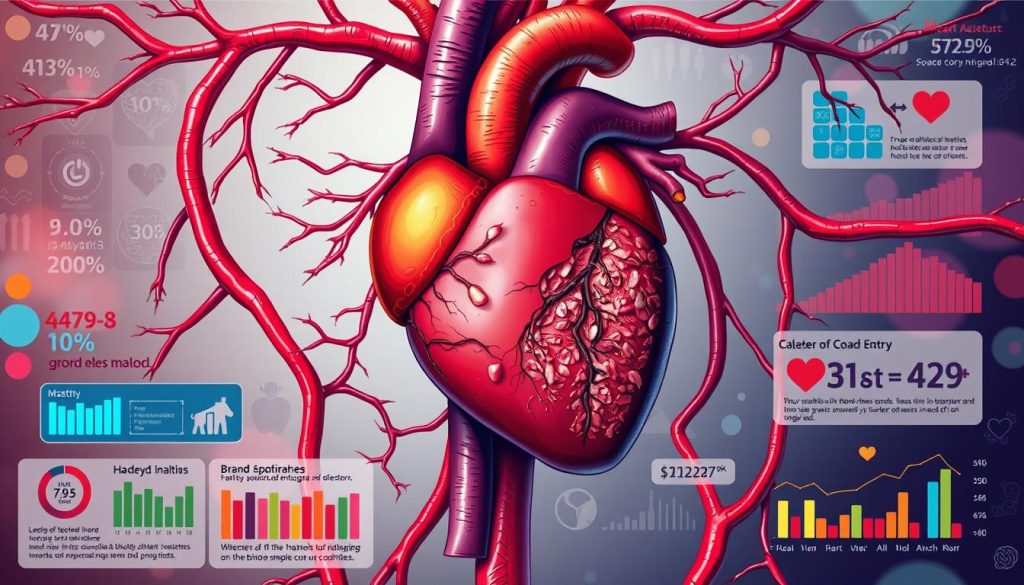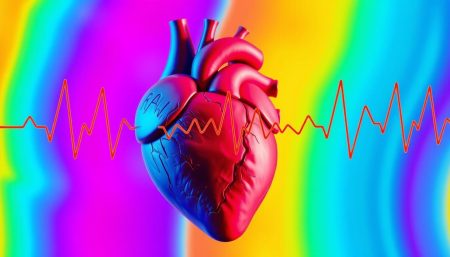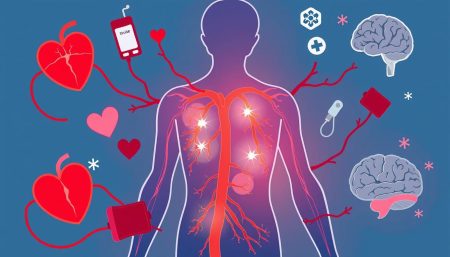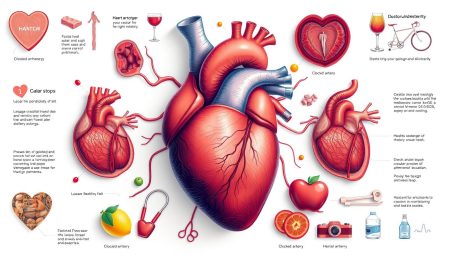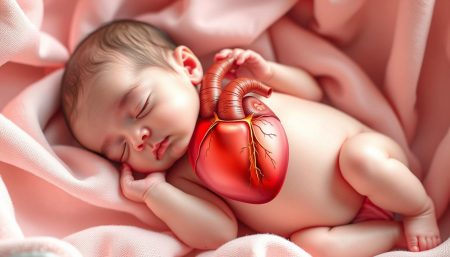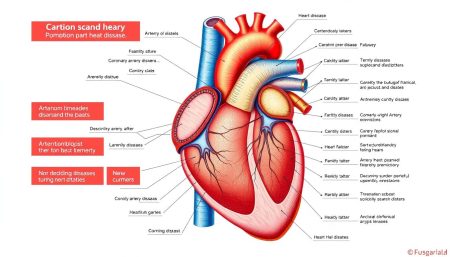Cardiovascular disease is a big health problem around the world. This guide will help you understand heart disease, stroke, and atherosclerosis. It’s packed with important info for keeping your heart healthy.
We’ll look at how to spot early signs and prevent these diseases. We’ll see how they affect global health. This guide aims to give you the knowledge to take care of your heart and overall health.
Join us as we explore heart health together. We’ll learn the key steps to keep your heart strong and healthy for the future.
What is a Cardiovascular Disease
Cardiovascular disease affects the heart and blood vessels. It can harm the whole circulatory system, leading to serious health issues. Knowing about cardiovascular disease and its types is key for prevention and early detection.
Different Types of Heart and Blood Vessel Disorders
Heart disease includes many conditions, like coronary artery disease and heart valve problems. Stroke happens when blood flow to the brain stops. Other issues are peripheral artery disease and deep vein thrombosis.
Common Risk Factors and Warning Signs
High blood pressure, smoking, obesity, and diabetes are major risk factors. Warning signs include chest pain, shortness of breath, and irregular heartbeat. For stroke, look out for sudden numbness, confusion, or severe headache.
Impact on Global Health Statistics
Cardiovascular disease is the top cause of death worldwide. In the U.S., it kills hundreds of thousands each year. The economic costs are huge, with healthcare and lost productivity in the billions.
“Cardiovascular disease is not just a health issue; it’s a global economic challenge that affects individuals, families, and entire communities.”
Understanding cardiovascular disease and its global impact helps us fight it. We can reduce risks and improve heart health worldwide.
Key Warning Signs and Symptoms of Heart Disease
Knowing the signs of heart disease can save lives. Catching it early means you can act fast. This could stop serious problems before they start. Let’s look at some common signs that might mean your heart is at risk.
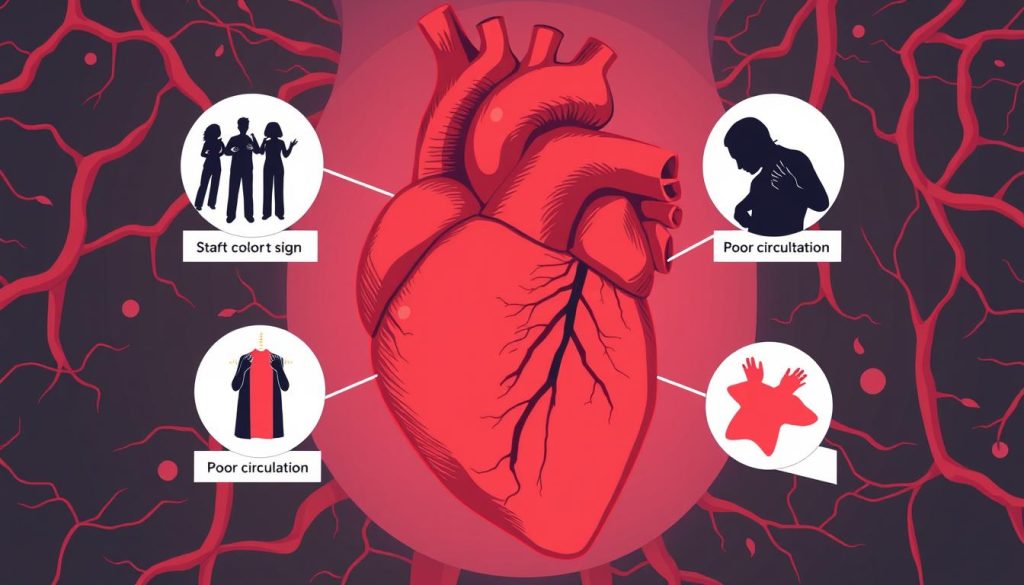
Chest discomfort is a big sign of heart disease. It might feel like tightness, squeezing, or fullness. This pain can also spread to your arms, neck, or jaw. Feeling short of breath, even when you’re not doing much, is another warning.
Feeling your heart beat irregularly or too fast is another sign. You might feel like your heart is racing or skipping beats. Feeling very tired or weak, and having other symptoms, could also mean heart trouble.
Swelling in your legs, ankles, or feet might mean your heart is failing. This happens when your heart can’t pump blood well. Feeling nauseous, having indigestion, or heartburn-like symptoms can also be signs, often in women.
| Warning Sign | Description | Action |
|---|---|---|
| Chest Pain | Pressure or squeezing sensation | Seek immediate medical attention |
| Shortness of Breath | Difficulty breathing during light activities | Consult a doctor promptly |
| Irregular Heartbeat | Heart racing or skipping beats | Schedule a check-up with a cardiologist |
| Swelling in Extremities | Puffiness in legs, ankles, or feet | Discuss with your healthcare provider |
If you notice these symptoms, get help right away. Remember, catching heart disease early can greatly improve your life and health.
Understanding Atherosclerosis: The Silent Killer
Atherosclerosis is a serious condition that affects millions of Americans. It develops slowly, often without symptoms. It’s caused by plaque buildup in arteries, leading to serious complications if not treated.
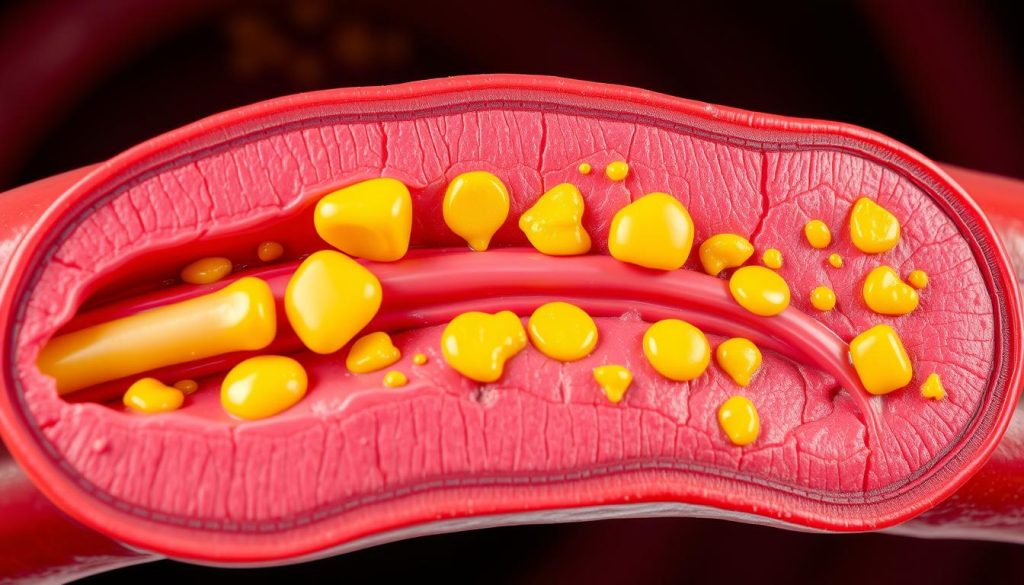
How Plaque Builds Up in Arteries
Plaque buildup starts when cholesterol and other substances gather in artery walls. These deposits harden and narrow the arteries, restricting blood flow. This can lead to heart attacks, strokes, or other serious health issues.
Risk Factors for Arterial Disease
Several factors contribute to atherosclerosis:
- High blood pressure
- Smoking
- High cholesterol levels
- Diabetes
- Obesity
- Lack of physical activity
Prevention and Treatment Options
Preventing atherosclerosis involves lifestyle changes and medical interventions. Regular exercise, a heart-healthy diet, and quitting smoking can reduce risk. For those diagnosed, treatments include medications to lower cholesterol and blood pressure. In severe cases, surgical procedures may be needed.
“Understanding atherosclerosis is key for heart health. Early detection and lifestyle changes can prevent its progression.”
By recognizing risks and taking proactive steps, individuals can protect their arteries and heart health. Regular check-ups and talking to healthcare providers are vital in managing this serious condition.
Hypertension: Managing Blood Pressure for Heart Health
Hypertension, or the “silent killer,” is a big threat to heart health. It affects millions of Americans, many without knowing it. High blood pressure makes the heart work harder and damages blood vessels, raising the risk of heart disease and stroke.

It’s important to understand blood pressure readings. The top number (systolic) shows pressure when your heart beats. The bottom (diastolic) shows pressure between beats. A normal reading is below 120/80 mm Hg.
| Blood Pressure Category | Systolic (mm Hg) | Diastolic (mm Hg) |
|---|---|---|
| Normal | Less than 120 | Less than 80 |
| Elevated | 120-129 | Less than 80 |
| Hypertension Stage 1 | 130-139 | 80-89 |
| Hypertension Stage 2 | 140 or higher | 90 or higher |
Managing hypertension means making lifestyle changes and sometimes taking medication. Regular exercise, a balanced diet low in sodium, and reducing stress can help. Quitting smoking and drinking less alcohol are also important steps.
If you have high blood pressure, your doctor might give you medication like ACE inhibitors or beta-blockers. It’s important to follow your doctor’s advice and check your blood pressure often.
By controlling your blood pressure, you’re protecting your heart. This reduces the risk of heart problems. Remember, prevention and early action are key to a healthy heart and well-being.
The Role of Cholesterol in Heart Disease
Cholesterol is key to heart health. Knowing its role helps us choose better for our health. Let’s look at the types of cholesterol and their effects on our hearts.
Good vs. Bad Cholesterol Explained
Cholesterol isn’t all the same. There are HDL and LDL types. HDL, or “good” cholesterol, helps clear other cholesterol from your blood. LDL, or “bad” cholesterol, can clog your arteries, raising heart disease risk.
| Type | Nickname | Function | Heart Disease Risk |
|---|---|---|---|
| HDL | Good Cholesterol | Removes cholesterol from bloodstream | Lowers risk |
| LDL | Bad Cholesterol | Can build up in arteries | Increases risk |
Dietary Impact on Cholesterol Levels
Your diet affects your cholesterol levels. Foods high in saturated and trans fats increase LDL. Eating more fruits, veggies, whole grains, and lean proteins can lower LDL and raise HDL.
Medical Treatments for High Cholesterol
If diet changes aren’t enough, doctors might prescribe meds. Statins are often used to lower LDL and prevent heart disease. Other treatments include bile acid sequestrants, cholesterol absorption inhibitors, and PCSK9 inhibitors.
“Managing cholesterol through diet and medication can significantly reduce your risk of heart disease. Regular check-ups and a heart-healthy lifestyle are key to maintaining optimal cholesterol levels.”
Understanding Heart Attacks and Stroke Risk
Heart attacks and strokes are serious health issues that can happen suddenly. It’s important to know how to react and protect yourself.
Immediate Response to Heart Attack Symptoms
If you think you’re having a heart attack, every second matters. Look out for chest pain, trouble breathing, and arm or jaw pain. Call 911 right away. Don’t drive to the hospital yourself. Emergency responders can start treatment immediately.
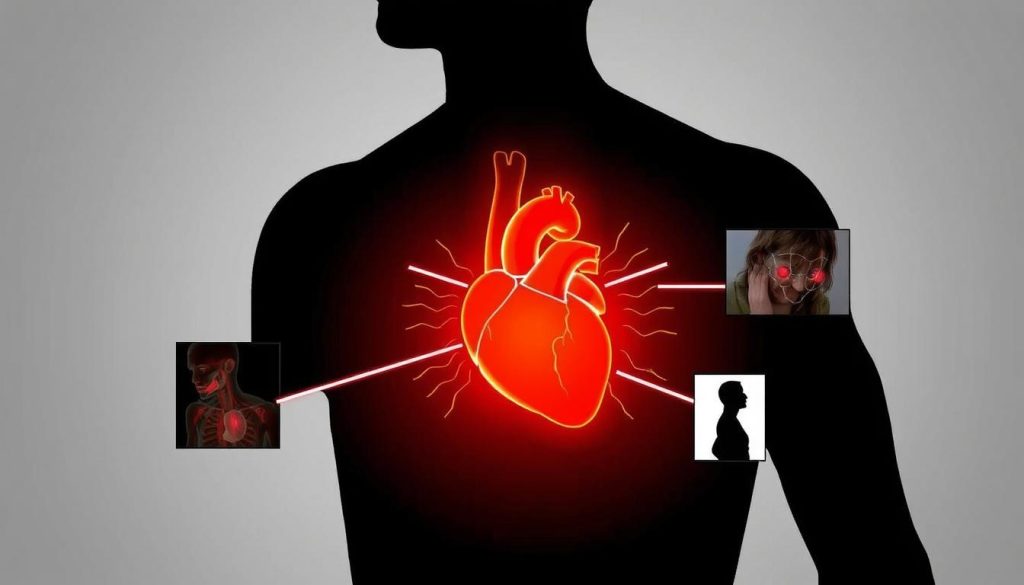
Recovery and Rehabilitation Process
Recovering from a heart attack is a long journey. It often includes cardiac rehab programs. These programs mix exercise, education, and counseling. They help patients get stronger, adopt healthy habits, and lower their risk of future heart issues.
Prevention Strategies
To prevent heart attacks and lower stroke risk, making lifestyle changes is key. Here are some important steps:
- Eat a heart-healthy diet full of fruits, veggies, and whole grains
- Exercise regularly – aim for 150 minutes of moderate activity weekly
- Quit smoking and drink less alcohol
- Manage stress with relaxation techniques or meditation
- Keep blood pressure, cholesterol, and diabetes in check with medication if needed
By following these steps, you can greatly lower your risk of heart attack and stroke. Remember, preventing heart problems is always better than treating them.
| Risk Factor | Impact on Heart Health | Prevention Strategy |
|---|---|---|
| High Blood Pressure | Increases strain on heart | Regular monitoring, diet changes, medication |
| High Cholesterol | Builds up in arteries | Healthy diet, exercise, statins if prescribed |
| Smoking | Damages blood vessels | Quit smoking programs, nicotine replacement |
| Obesity | Strains heart, increases other risks | Weight loss through diet and exercise |
Living with Arrhythmia: Causes and Treatments

Arrhythmia, or heart rhythm disorders, can really affect your daily life. These irregular heartbeats can be harmless or very serious. It’s important to know what causes them and how to treat them for good heart health.
Common causes of arrhythmia include:
- Heart attacks or scarring from previous heart attacks
- Coronary artery disease
- High blood pressure
- Certain medications
- Excessive caffeine or alcohol consumption
Symptoms can vary, but often include palpitations, shortness of breath, and dizziness. If you notice these symptoms, it’s vital to see a healthcare provider for the right diagnosis and treatment.
Treatments for arrhythmia depend on the type and how serious it is. Options include:
- Medications to control heart rate or rhythm
- Lifestyle changes, such as reducing stress and limiting caffeine
- Cardioversion to reset the heart’s rhythm
- Catheter ablation to destroy problematic heart tissue
- Implantable devices like pacemakers or defibrillators
Managing arrhythmia often means ongoing care. Regular check-ups, sticking to treatment plans, and a heart-healthy lifestyle are essential. These steps help manage heart rhythm disorders well.
“Understanding your arrhythmia and working closely with your healthcare team can lead to improved quality of life and reduced risk of complications.”
By staying informed and proactive, people with arrhythmia can live fulfilling lives. They can manage their condition well.
Congenital Heart Defects: From Diagnosis to Management
Congenital heart defects (CHDs) are heart problems babies are born with. They affect about 1% of babies in the U.S. each year. These defects can be simple or complex, impacting the heart’s structure and function.
Common Types of Heart Defects
There are many types of CHDs. Some common ones include:
- Septal defects (holes in heart walls)
- Valve abnormalities
- Narrowed arteries
- Complex defects affecting multiple heart parts
Treatment Options and Living with CHD
Treatment for CHD depends on the type and severity. Options include:
- Medications to manage symptoms
- Catheter procedures to repair defects
- Open-heart surgery
- Heart transplant in severe cases
Living with CHD means ongoing cardiac care. Regular check-ups, a heart-healthy lifestyle, and proper management of related health issues are essential.
Pregnancy and CHD Considerations
Pregnancy with CHD needs special care. Women with CHD should:
- Consult their cardiologist before getting pregnant
- Work closely with a high-risk pregnancy team
- Monitor heart function throughout pregnancy
- Be aware of risks to mother and baby
| CHD Type | Pregnancy Risk Level | Special Considerations |
|---|---|---|
| Simple septal defects | Low | Regular monitoring |
| Complex CHD | High | May require specialized care |
| Eisenmenger syndrome | Very high | Pregnancy often not recommended |
Peripheral Artery Disease: Beyond the Heart
Peripheral artery disease (PAD) affects blood vessels outside the heart. It impacts circulation all over the body. This condition narrows arteries, reducing blood flow to limbs and organs.
PAD often shows up as leg pain when walking, known as claudication. Other signs include:
- Numbness or weakness in legs
- Cool skin on legs or feet
- Slow-healing wounds
- Hair loss on legs
Risk factors for PAD include smoking, diabetes, high blood pressure, and high cholesterol. Early diagnosis and treatment of PAD are key to prevent serious complications like heart attack or stroke.
Doctors use tests like the ankle-brachial index to diagnose PAD. This test compares blood pressure in the arms and ankles. Treatment aims to improve circulation and lower cardiovascular risk through lifestyle changes, medication, or surgery.
| PAD Treatment Options | Benefits |
|---|---|
| Lifestyle changes (quitting smoking, exercise) | Improves overall health, reduces symptoms |
| Medications (statins, blood thinners) | Lowers cholesterol, prevents blood clots |
| Angioplasty or bypass surgery | Restores blood flow in severely blocked arteries |
Managing PAD requires a complete approach. By tackling this condition, patients can enhance their quality of life and lower their risk of heart problems.
Lifestyle Changes for Heart Disease Prevention
Preventing heart disease starts with making smart lifestyle choices. A few key changes can greatly reduce your risk of heart problems. Eating a balanced diet full of fruits, vegetables, and whole grains is a good start. These foods give you the nutrients you need and help you stay at a healthy weight, which is key for your heart.
Regular exercise is also essential. Try to do at least 150 minutes of moderate activity each week. Activities like brisk walking, swimming, or cycling are great. Exercise helps control your weight, lowers stress, and makes your heart stronger.
Don’t forget about managing stress, which is important for heart health. Try deep breathing, meditation, or yoga to keep stress down. Quitting smoking and drinking less alcohol are also big steps towards a healthier heart. Remember, every small step towards a healthier lifestyle can make a big difference.
FAQ
Q: What is cardiovascular disease?
A: Cardiovascular disease affects the heart and blood vessels. It includes heart disease and stroke. It can cause heart attacks and chest pain.
Q: What are the main types of cardiovascular diseases?
A: There are many types, like coronary artery disease and heart valve disease. Each affects different parts of the heart or blood vessels. They need specific treatments.
Q: What are the common risk factors for cardiovascular disease?
A: Risk factors include high blood pressure and high cholesterol. Smoking, obesity, and diabetes are also risks. Diet and family history matter too.
Q: How can I recognize the warning signs of a heart attack?
A: Warning signs include chest pain and shortness of breath. Pain in the arms, back, or jaw is also a sign. Seek help right away if you feel these symptoms.
Q: What is atherosclerosis and how does it develop?
A: Atherosclerosis is when plaque builds up in arteries. It narrows and hardens them. High cholesterol and inflammation cause it. It can lead to serious heart problems if not treated.
Q: How does hypertension affect heart health?
A: High blood pressure strains the heart and blood vessels. It can cause heart disease and stroke. Keeping blood pressure in check is key to heart health.
Q: What’s the difference between “good” and “bad” cholesterol?
A: “Good” cholesterol helps remove other cholesterol. “Bad” cholesterol builds up in arteries. Keeping a balance is important for heart health.
Q: How can I prevent heart disease?
A: Prevent heart disease with a healthy lifestyle. Eat well, exercise, and don’t smoke. Manage stress and control blood pressure and diabetes.
Q: What is an arrhythmia?
A: An arrhythmia is an irregular heartbeat. It can be harmless or life-threatening. Some need medical attention.
Q: What are congenital heart defects?
A: Congenital heart defects are heart problems at birth. They can be simple or complex. Some may need surgery.
Q: What is peripheral artery disease (PAD)?
A: PAD is a circulatory problem in the limbs, often the legs. It’s caused by narrowed arteries. It can lead to pain and numbness, and is a sign of atherosclerosis elsewhere.












